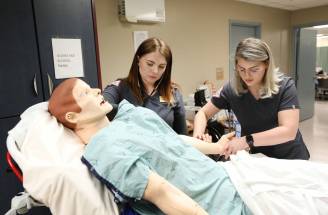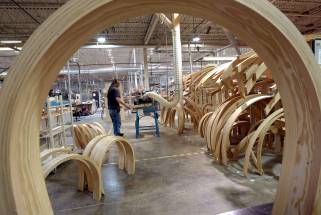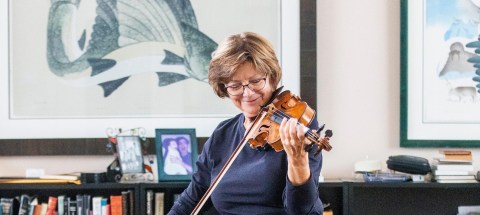Take a bow As the WSO’s concertmaster for 35 years, setting an example is Gwen Hoebig’s forte
Read this article for free:
or
Already have an account? Log in here »
To continue reading, please subscribe:
Monthly Digital Subscription
$0 for the first 4 weeks*
- Enjoy unlimited reading on winnipegfreepress.com
- Read the E-Edition, our digital replica newspaper
- Access News Break, our award-winning app
- Play interactive puzzles
*No charge for 4 weeks then price increases to the regular rate of $19.00 plus GST every four weeks. Offer available to new and qualified returning subscribers only. Cancel any time.
Monthly Digital Subscription
$4.75/week*
- Enjoy unlimited reading on winnipegfreepress.com
- Read the E-Edition, our digital replica newspaper
- Access News Break, our award-winning app
- Play interactive puzzles
*Billed as $19 plus GST every four weeks. Cancel any time.
To continue reading, please subscribe:
Add Free Press access to your Brandon Sun subscription for only an additional
$1 for the first 4 weeks*
*Your next subscription payment will increase by $1.00 and you will be charged $16.99 plus GST for four weeks. After four weeks, your payment will increase to $23.99 plus GST every four weeks.
Read unlimited articles for free today:
or
Already have an account? Log in here »
Hey there, time traveller!
This article was published 25/10/2022 (1139 days ago), so information in it may no longer be current.
Gwen Hoebig doesn’t believe in looking back. The Winnipeg Symphony Orchestra concertmaster keeps her eyes firmly fixed on the horizon while marking her 35th anniversary in tandem with the WSO’s own diamond jubilee this year.
Remarkably, the Vancouver-born artist — appointed to her prestigious position in 1987 and regarded one of Canada’s top violinists — is only the fourth concertmaster in the 75-year-old orchestra’s history.
“It doesn’t feel like 35 years at all, because there’s more to discover and there’s more to do. I’m having a lot of fun with it,” Hoebig says during an interview at the south Winnipeg home she shares with her husband, David Moroz, a pianist and University of Manitoba Desautels Faculty of Music professor.
MIKAELA MACKENZIE / WINNIPEG FREE PRESS Violinist Gwen Hoebig is celebrating her 35th season this year as WSO concertmaster.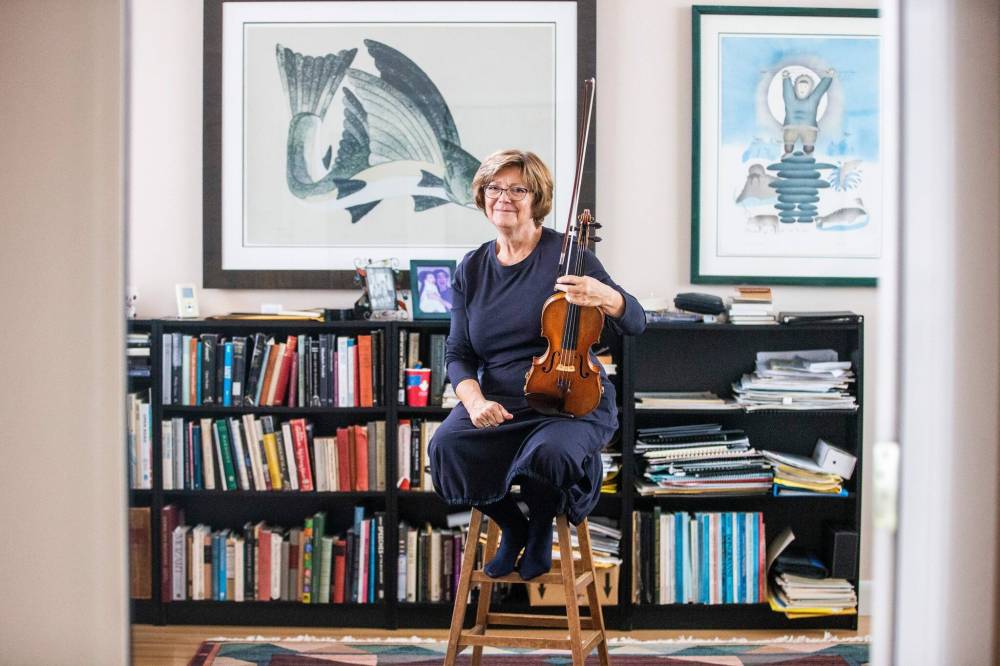
The couple’s two children, violist Alexander (Sasha) Moroz, 22, and cellist Juliana (Juli) Moroz, 20, are currently carving out their own musical careers at the University of Ottawa, where Sasha is “between degrees,” and the McDuffie Center for Strings in Macon, Ga., respectively.
The concertmaster, a.k.a. “first chair violin,” seated at the front of the stage close to the conductor’s podium, primarily serves as a liaison between musicians and maestro, performs all violin solos in programmed repertoire, tunes the orchestra before each concert, advises on seasonal programming as required, and marks detailed bowing instructions into the violin and viola sections’ scores prior to rehearsals.
All take their cue from Hoebig, bowing in her exact same pattern to create a cohesive sound in the spirit of the composer’s intentions.
Hoebig is even more succinct: “I set the standard for the orchestra,” she says. “My overriding goal as concertmaster is to play as well as I possibly can to maintain the highest level of excellence. I prefer to lead by example more than talking, as it’s ultimately about the music. But I’m also not afraid to speak up when it’s necessary.”
PHIL HOSSACK / FREE PRESS FILES Hoebig performs Gary Kulesha's Violin Concerto to open the 2000 New Music Festival.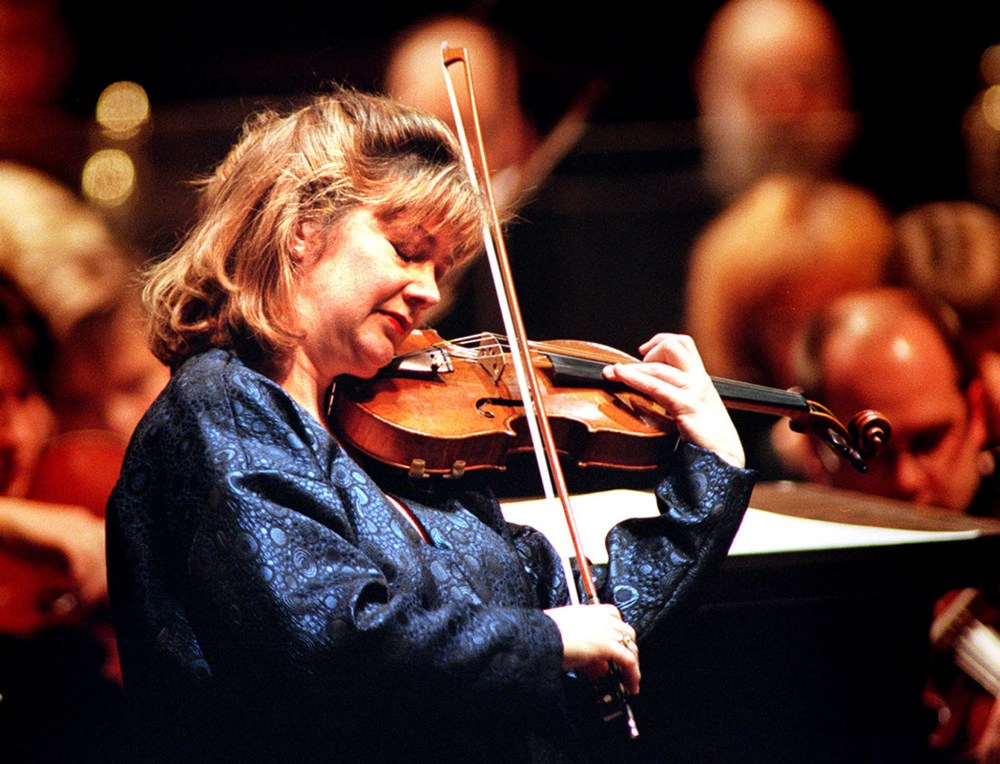
WSO music director Raiskin, a violist who also serves as principal guest conductor of the Belgrade Philharmonic Orchestra and principal conductor of the Slovak Philharmonic Orchestra, sings praises for Hoebig during a phone interview from Bratislava, Slovakia.
“It’s an incredible gift to have a concertmaster with whom I can communicate and understand blindly, and openly discuss the many things that we do,” the Russian-born maestro says of his simpatico relationship with Hoebig, forged in the pressure cooker of rehearsals.
“Not only is she incredibly reliable and experienced, but she’s also that kind of leader who communicates with her colleagues in such a way that it has earned her an enormous amount of respect. Gwen is a quiet force and it’s a blessing to the orchestra to have her, and for so many years.”
Hoebig describes her personal leadership style as “collaborative,” which serves her well whether she’s working with her colleagues and Raiskin, or teaching and mentoring the next generation of violinists through the U of M or Calgary’s Mount Royal College in Calgary, where she is a member of the extended faculty.
MIKAELA MACKENZIE / WINNIPEG FREE PRESS 'I set the standard,' says Hoebig about her role as concertmaster.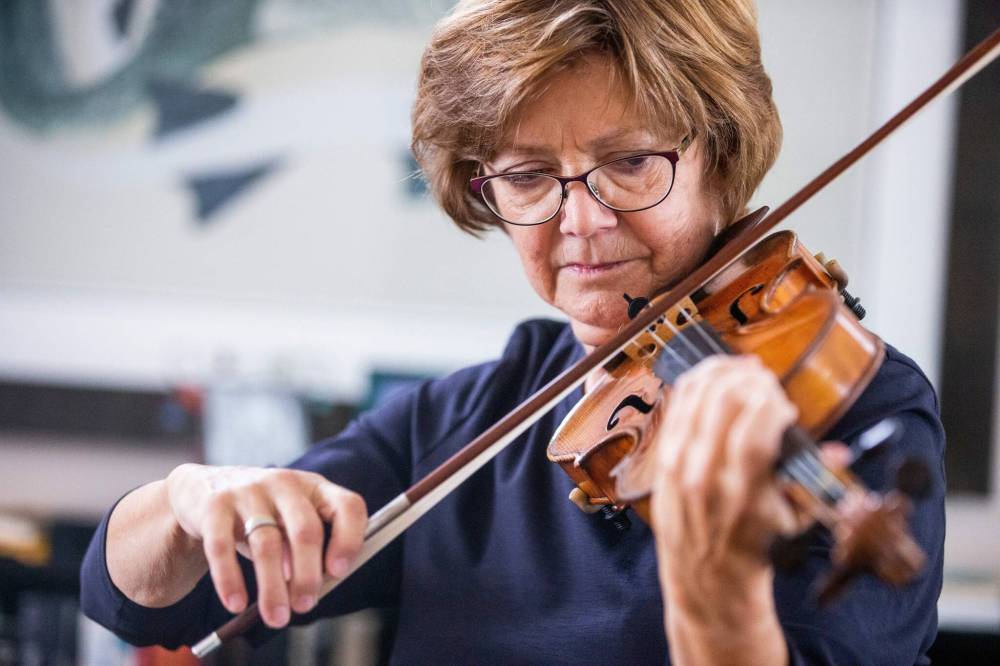
The soft-spoken artist began studying fiddle in Vancouver at the age of five with her late father Helmut Hoebig, a violinist and professional pastry chef, before marking her orchestra debut two years later with the Vancouver Youth Orchestra. She also played chamber music with her equally accomplished cellist brother, Desmond Hoebig, while growing up in Vancouver, cheered on by their late mother, a well-known voice teacher Patricia Hoebig.
Her flourishing talent quickly led her to New York City’s the Juilliard School, where she met the Winnipeg-born Moroz. She embarked on a double major as pianist/violinist, before dedicating herself full-time to the latter instrument under famed pedagogue and violinist Sally Thomas, who also taught Brandon-born virtuoso James Ehnes.
Prior to her arrival in Winnipeg, Hoebig — a highly respected chamber musician who performs regularly with the Winnipeg Chamber Music Society’s “house band,” the Clearwater Quartet — served as concertmaster for Montreal’s Orchestre des jeunes du Québec (1983-85) and performed for three seasons with the Orchestre symphonique de Montréal’s (OSM). She was also concertmaster for Manitoba Chamber Orchestra between 1987 and ‘90, a postition now held by WSO associate concertmaster Karl Stobbe.
Searching for greater leadership responsibilities at the time, Hoebig applied to her first choice of available concertmaster positions, the WSO, as well as to similar posts in Calgary and Quebec City. She was ultimately given the nod after three gruelling rounds at a blind audition, in which she performed behind a screen at the Centennial Concert Hall.
DANIEL CRUMP / FREE PRESS FILES Hoebig performs a Bach violin concerto on opening night in October 2020.
She admits it was a “big deal” to join what is still arguably an old boy’s club as a rare female concertmaster back in the late 1980s, a role that has thankfully become more common.
Principal flutist Jan Kocman, who celebrates his own 50th anniversary with the WSO next season, recalls a 20-something upstart violinist from Vancouver taking the reins as the ensemble’s newest concertmaster.
“Being concertmaster is a very delicate and difficult position at times, as an interpreter or conduit for the music director’s vision, as well as for guest conductors,” the wind player explains over the phone.
“Gwen has done exceptionally well in striking that balance, and has grown into the role while navigating through all those years with many different music directors and guest conductors, and in the most positive way,” he says.
COLIN CORNEAU / BRANDON SUN FILES Hoebig performs with the WSO at the Centennial Auditorium in Brandon in March 2011.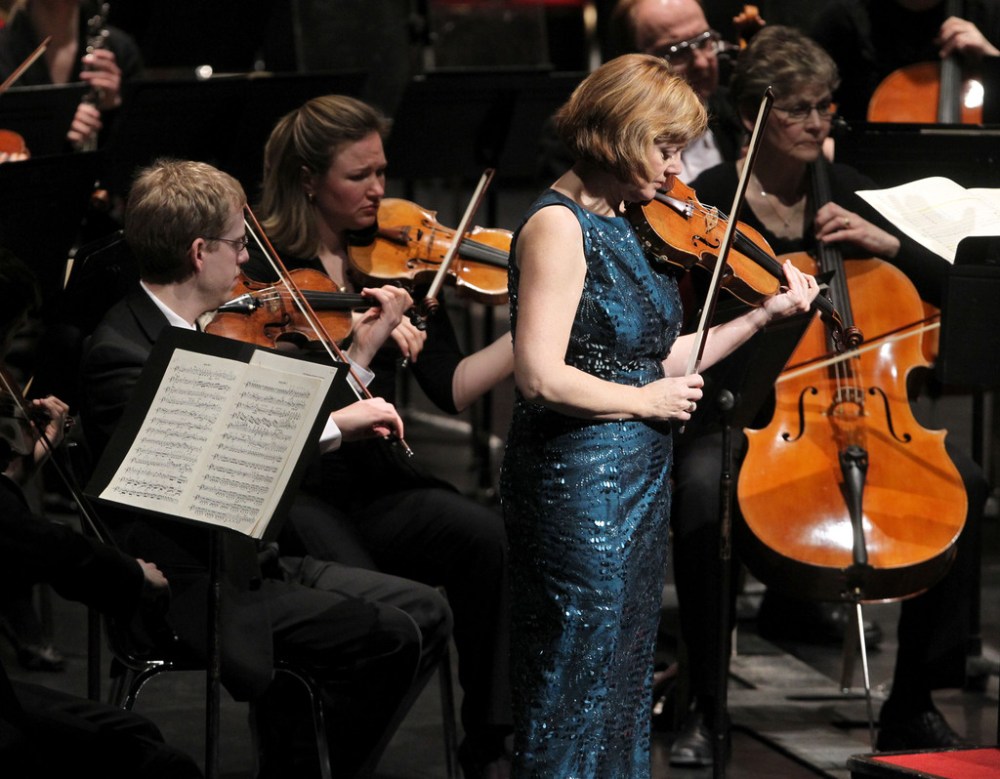
Stobbe, who first joined the WSO in 1996 and sits directly to Hoebig’s left onstage as her “stand mate,” is uniquely positioned, literally, to speak about her contributions to the orchestra, which is often described as a family. As associate concertmaster, Stobbe must also be prepared to step in for Hoebig on extremely short notice should illness strike – a sobering reality during an age of COVID-19.
“Gwen is such a great violinist, which is obviously very important, with a sweet, clean sound and can really connect with listeners and express herself,” says Stobbe, who recorded an album of violin works by Jean-Marie Leclair with Hoebig in 2018.
“She has also performed a stunning number of Canadian world premières, and worked directly with composers in bringing new music to audiences during the Winnipeg New Music Festival. I don’t know how many other violinists would have those kind of numbers behind them, with a versatility and consistency that is always there,” he affirms.
Hoebig has performed on her treasured and “trusty” Italian-made Carlo Ferdinando Landolfi (1770-75) since 1997 — she keeps a replica handcrafted by Winnipeg-based luthier Garth Lee on tap — and cites Beethoven’s Violin Concerto in D Major as one of her go-to “desert island” pieces for its “purity,” in addition to any of Brahms’ lushly romantic works. She treated listeners to one of her signature pieces, Vaughan Williams’ The Lark Ascending, during the WSO’s Manitoba Remembers: A COVID Elegy program last April, with her breathtaking performance lauded by Raiskin as “mesmerizing.”
MIKAELA MACKENZIE / WINNIPEG FREE PRESS When Gwen Hoebig joined the WSO 35 years ago, female concertmaster were rare.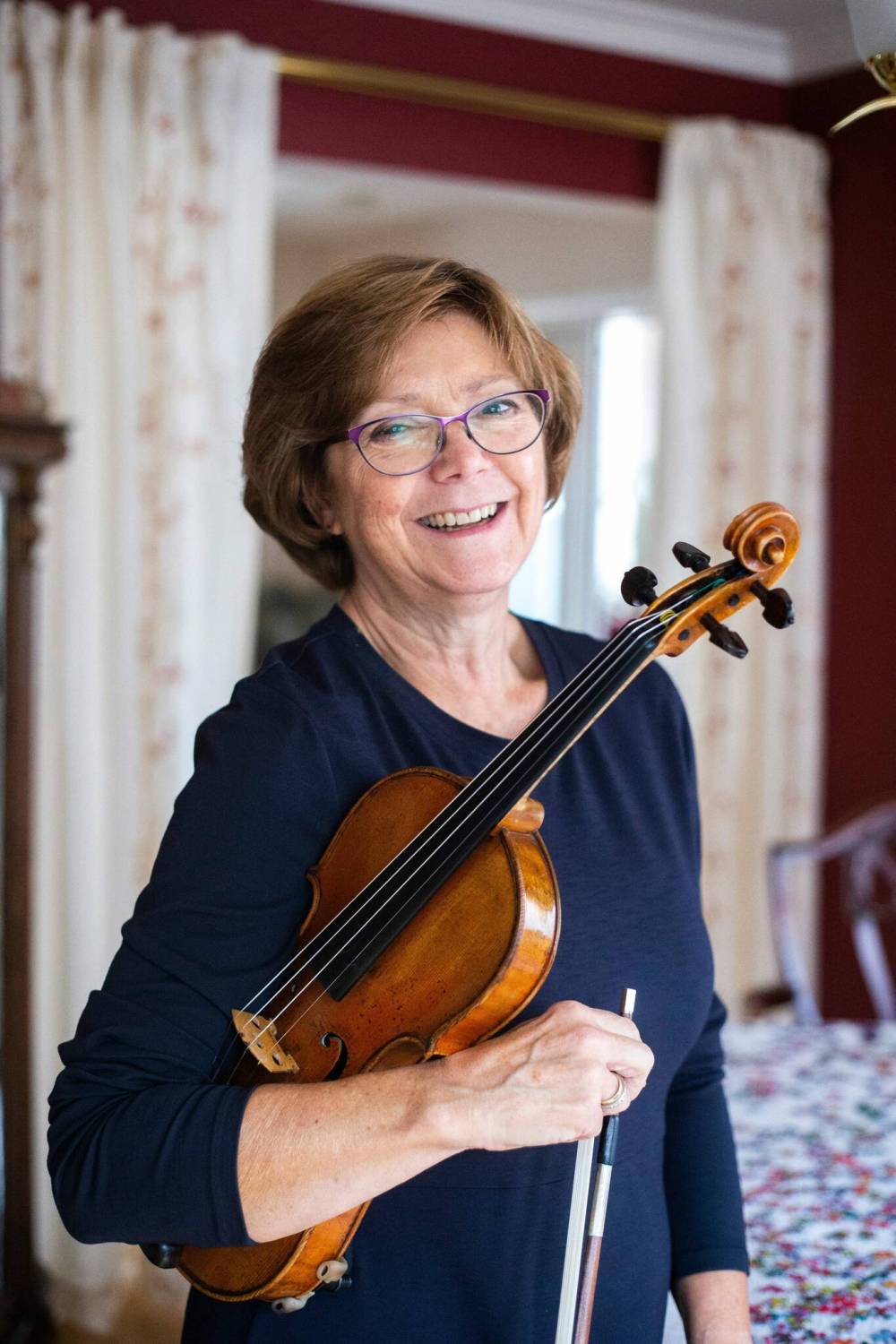
She is currently preparing to be showcased alongside colleague Sonia Lazar on Dec. 3. Violins of Hope, hosted by third-generation Israeli violinmaker Avshalom (Avshi) Weinstein and led by Raiskin, will see the two artists performing on violins that once belonged to Jewish musicians who perished during the Holocaust, promising a profoundly moving night that will take listeners from the darkness of despair to the light of eternal hope.
Hoebig is the first to admit she is “up there” in an elite club of longest-serving concertmasters in Canada, with its elder, the OSM’s Richard Roberts, having announced his retirement after 40 years last month. The inevitable question arises about her eventual retirement from the stage.
“I’m not there yet, and I am going to take each year as it comes,” the violinist replies without missing a beat. “I do hope, though, that when it comes time, I make the decision before anyone else makes it for me.
“I feel so fortunate and amazed that I’ve been able to do everything that I’ve done for 35 years, including giving back to the community as a whole, but am still very much looking ahead to the future and loving what I do.”
holly.harris@shaw.ca


